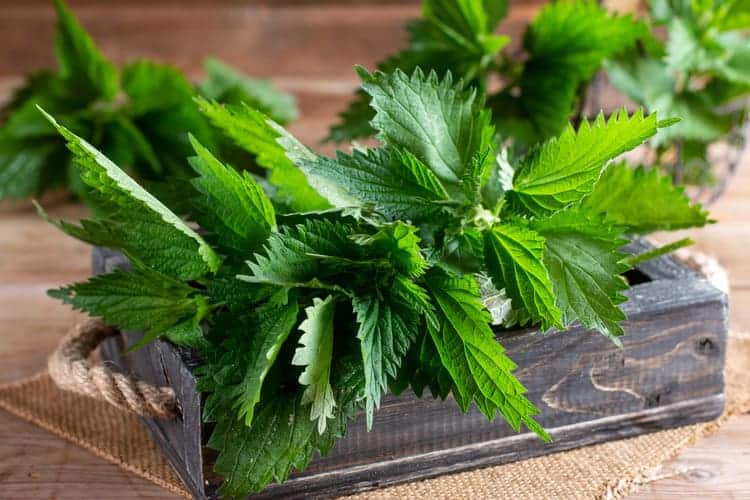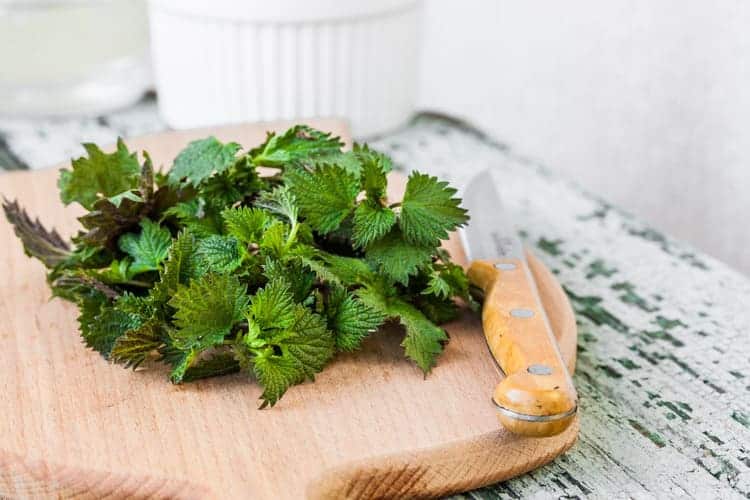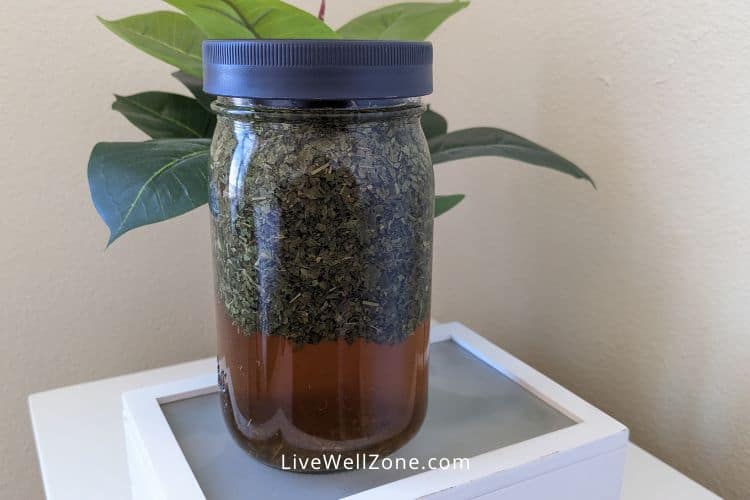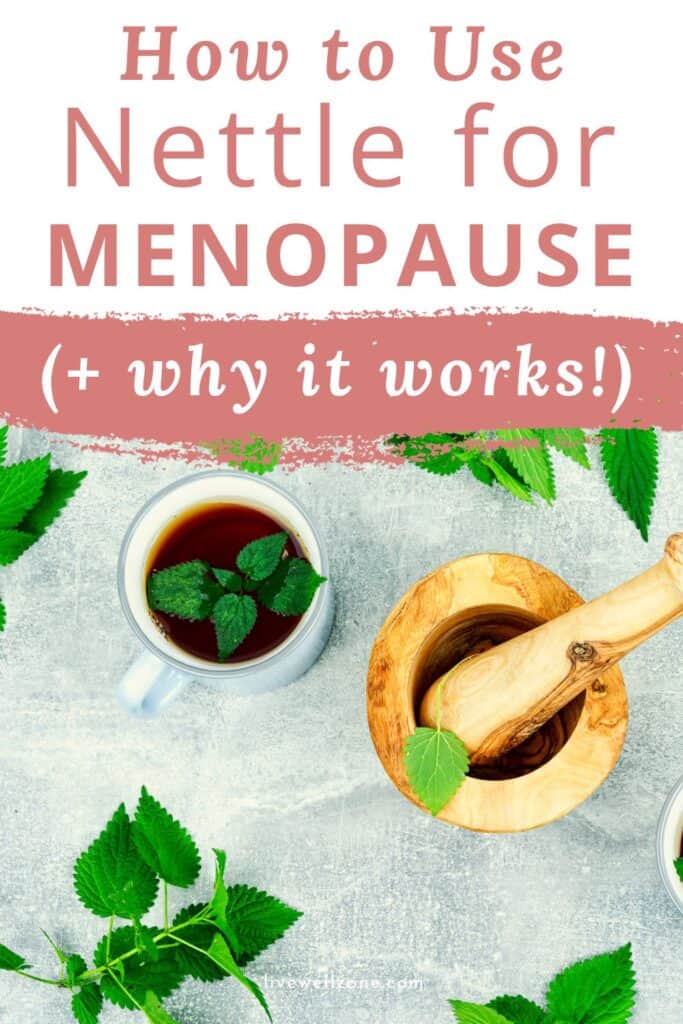
To say that stinging nettle is a versatile herb would be an understatement! Not only is it traditionally used to improve heavy periods, inflammation, fatigue and allergies, but a 2022 scientific review states that “Stinging nettle can ease the transition and act as a restorative for women going through menopause, lowering the intensity of the hormonal shift in the body.”
So, what is it about this common weed that makes it such a helpful ally during menopause?
Well, you’re going to get all the details in this article where you will learn:
- The 5 main benefits of nettle for menopause.
- How to use it.
- Bonus tips on the side effects of nettle and its effects on hormones like estrogen.
Let’s get to it!
STINGING NETTLE BENEFITS FOR WOMEN IN MENOPAUSE

1. May Ease Hot Flashes
According to a 2019 randomized, double blind clinical trial, women who took stinging nettle experienced a decrease in hot flashes as well as an improvement in quality of life.
That study was conducted with 72 postmenopausal women aged 45-60, who were experiencing at least 20 hot flashes per week.
The participants were divided into 4 groups as follows (source):
- Group A: 450 mg of nettle per day + 11 acupuncture sessions.
- Group B: placebo + acupuncture sessions.
- Group C: nettle + fake acupuncture.
- Group D: placebo + fake acupuncture.
The treatments lasted for 7 weeks and then there was a followup 4 weeks after.
The results showed that the women taking nettle experienced less hot flashes and they also reported an improvement in quality of life.
In addition, the researchers found that the combination of nettle and acupuncture “did not add to the effects of those therapies.”
2. May Lighten Heavy Perimenopause Periods
For women in perimenopause hormonal changes often lead to excessive menstrual bleeding.
Stinging nettle happens to be a natural remedy that herbalists rely on to alleviate heavy periods.
One of the reasons why nettle may help in this situation is that it contains vitamin K.
Vitamin K is essential for blood clotting (aka coagulation) and some scientific literature states that vitamin K deficiency contributes to heavy periods (source).
In addition, nettle is rich in iron and is traditionally used to replenish iron levels (which get depleted when there’s chronic heavy menstrual bleeding).
3. May Improve Vaginal Atrophy
As estrogen decreases during the menopausal years, many women experience vaginal atrophy (dryness, thinning and inflammation of the vaginal tissue).
This often leads to painful intercourse, a burning sensation during urination and many other disruptive symptoms.
Interestingly, stinging nettle contains phytoestrogens, which are often used as a natural remedy for vaginal atrophy.
In fact, a triple blind randomized placebo-controlled study found that post-menopausal women who used a 5% nettle vaginal cream for 8 weeks experienced improvements in:
- Burning.
- Dryness.
- Itching.
- Pain during intercourse.
Aside from its phytoestrogen content, the study also points out that nettle’s ability to boost collagen, as well as the plant’s vitamin D and E content, all contribute to its positive effects on atrophy (source).
4. Supports Hormonal Balance
As mentioned earlier, a scientific review on the benefits of nettles states that it can reduce the intensity of menopausal hormonal changes and also, support women’s health overall.
This is probably due to nettle’s diverse nutritional composition, which includes:
- Minerals like iron, magnesium, manganese and calcium.
- Vitamins like vitamin A,C, K, B6 and B12.
- Antioxidants like flavonoids and phenolic acids.
For a deeper dive into this particular benefit, read this guide on nettle for hormones.
5. Supports Overall Well-Being
As if supporting hormone balance isn’t enough, the 2022 review mentioned above points out that nettle leaf has the following properties:
- Improves urinary tract infections (thanks to its diuretic properties).
- Reduces excessive bleeding (thanks to nettle’s coagulant properties).
- Supports bone health (thanks to its high mineral content).
- Supports elimination of toxins.
- Anti-hypertensive.
- Anti-diabetic.
- Anti-inflammatory.
HOW TO USE NETTLE DURING MENOPAUSE: LEAF, ROOT, TEA & MORE
1. Nettle Tea (Overnight Infusion)

A strong nettle leaf tea aka, an overnight infusion, is one of the common ways that herbalists use stinging nettle.
This particular type of tea differs from a regular tea because you use a lot more herb and you let the tea sleep for several hours (usually overnight).
Here’s how to make it:
- Combine 1 ounce (by weight) of nettle leaves with 1 quart of freshly boiled water in a mason jar (or french press).
- Cover and allow to steep overnight.
- Strain out the herbs and drink throughout the day. Add a little honey if you wish. Some people like to add a little salt to reduce the earthy flavor of nettles.
2. Tincture or Capsules
If convenience is a priority, you can also take nettle leaf in the form of capsules or a tincture (a liquid extract of nettle, with either alcohol or glycerin as the base liquid).
For capsules, I suggest these from Gaia Herbs. It’s a soft capsule that contains a liquid extract of nettle leaf.
As for a tincture, you can look into this one from Mary Ruth’s Organics.
3. Nettle Root
Even though nettle leaf is most often used for women’s health, the root of the plant also has health benefits.
However, the nettle root is more often used for men’s health (particularly related to prostate health).
If you’d like to learn more about whether nettle root can help you during menopause, it’s best to check with your doctor or herbalist.
RELATED QUESTIONS ABOUT NETTLE FOR MENOPAUSE HORMONES
What are the negative side effects of stinging nettle?
Side effects of nettle include upset stomach, diarrhea, water retention and stinging, when handling fresh nettles (source).
Does nettle leaf lower estrogen or affect estrogen in any way?
Stinging nettle is known to inhibit aromatase (the enzyme responsible for the conversion of androgens to estrogens).
This aromatase-inhibiting effect is sometimes applied in the realm of men’s health, where stinging nettle root is used to improve benign prostatic hyperplasia (source).
CONCLUSION
With so many different benefits and uses, the question may not be “will nettle help me?” but rather, “how could nettle help me?”
I hope that this article has answered your burning questions about all the ways in which nettle could support your health through the menopausal years!

You Might Also Like:
Top Benefits of Vitamin K For Heavy Periods and How to Use It
The Amazing Benefits of Nettle Leaf for Your Period (+ How to Use It)
10 Powerful Herbs for Menopause Weight Gain (+ Best Products)
How to Go Through Menopause Naturally: 7 Steps To Start Using Today
Estroven vs Happy Mammoth: Which Is Best for Menopause Symptoms?



